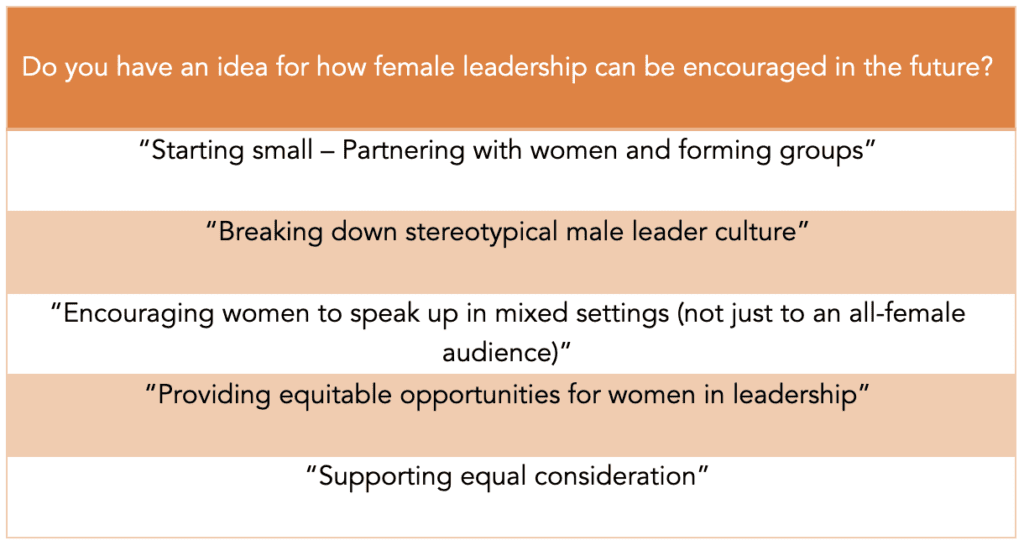Supporting women in all industries of the workforce is an essential component of achieving gender equality. Allowing women to lead and affect real change ensures that this support is not just symbolic – instead, it represents genuine efforts to recognise and learn from the skills and talents of female leaders.
As Queenslanders look forward to the 2032 Brisbane Olympics and Paralympics, the knowledge that our city is being assessed on the global stage presents a much-needed push to reach diversity and inclusion targets across the state. This includes getting more women into leadership positions, both directly contributing to the Olympic committee, and supporting all Brisbane industries as the city takes on profound growth and change.
Women’s Industry Night (WIN)
Recently, Articulous attended the Women’s Industry Night (WIN), a networking and career building event for female-identifying students at The University of Queensland. As a female-led professional communication and engagement consultancy, advising on several high-level projects across Brisbane, we were interested in fielding student’s perception of women’s inclusion in leadership and major decision-making opportunities across Brisbane.
Speaking with female-identifying students on the evening, we found that their career ambitions ranged from leading a small project or group, to contributing to federal politics.
When asked which occupation they would like to work in in the future, survey respondents were eager to contribute to the health care, law, politics, journalism, and professional service industries.
According to our survey results, it is evident that Queensland women are working to gain the experience required to lead. ‘Volunteering for a position within a university club or community group leadership team’ was the most popular form of leadership preparation taken by participants (88%), followed by ‘Completing a leadership course (UQ, LeadHers, LinkedIn, or external)’ (44%).

Strategies taken by UQ Survey Respondents to Build Professional Competencies and Future Leadership Potential (%) (Source: Articulous)
Being treated differently by male counterparts in leadership roles and in the workforce was an experience noted by respondents. One participant wrote:
“In my previous role as a shift manager, the company held boys after-work drinks and mentoring but nothing for female leaders. I was one of three women in the management team and we were often overlooked in favour of less experienced male managers.”
– Survey Respondent
The act of excluding women from workplace social outings, and personal development opportunities is recorded in various industries nation-wide.
So, what are the facts?
The Workplace Gender Equality Agency Employer Census 2021-22 revealed that while the proportion of working men and women is roughly 50:50, women are more likely to be employed part-time or casually.
As a result, only 2 out of 5 full time employees in Australia are women.
Men also disproportionately hold managerial positions (59%), even within female dominated industries.
Further, women’s representation in leadership is found to decline with seniority. For example, while the proportion of female senior managers is 38.6%, the proportion of female CEOs is 22.3%.
Unfortunately, the impact of gender inequality permeates several aspects of labour force participation and representation, beyond one’s position of employment.
The census also revealed that only 1 in 5 boards are gender balanced.
And finally, the 2022 National Survey on Sexual Harassment, commissioned by the Australian Human Rights Commission, revealed that 41% of working women have been sexually harassed at work.
When we asked our Women’s Industry Night (WIN) survey participants to identify the most significant barrier to female leadership, 66% selected ‘Lack of encouragement’, followed by ‘Experiences of Harassment and Misogyny in the Workplace’ (25%).

The Biggest Barrier to Female Leadership, Identified by UQ Survey Respondents (%) (Source: Articulous)

At Articulous, we understand that representation is crucial for allowing people to identify with and imagine themselves assuming certain goals and aspirational positions. We believe that the masses of data stating that women are underrepresented in leadership positions and in the workforce in general, speak to a society in which young women are deterred from envisioning themselves in a leadership role in the future.
Women in our Olympic and Paralympic future
With the 2032 Olympics drawing nearer, it’s time to take a harder look at the opportunities we have to uplift and inspire the next generation of female leaders.
In fact, many organisations including the Queensland Council of Social Services (QCOSS), are calling for the 2032 Olympic and Paralympic Games Organising Committee to formally commit to a goal of upholding and promoting diversity, gender equality and human rights.
As of June 2022, nine of the 22 positions on the Brisbane 2032 Olympic and Paralympic Organising Committee were women. Of this selection, Cindy Hook has been appointed to the role of Chief Executive Officer and has previously worked towards gender equality through her role on the Male Champions for Change coalition. This brings a hopeful outlook to the impact on gender inequality driven by the Games.
When we asked Women’s Industry Night (WIN) survey respondents about what can be done to encourage female leadership in the years leading to the Games, they offered the following ideas:

With bright young leaders in charge of the future, we’re certainly in safe hands.
We so greatly enjoyed meeting all of the students in attendance. Many thanks to the University of Queensland for having us at the Women’s Industry Night (WIN).






